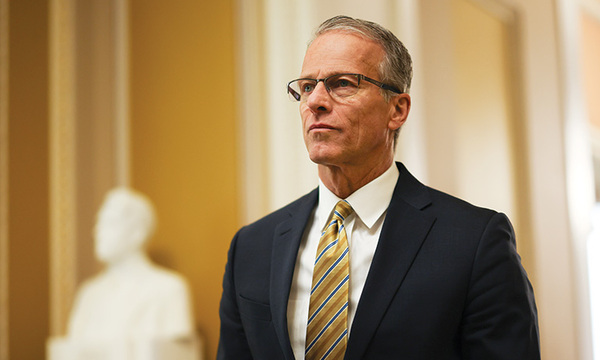Christians are gullible and stupid. Whether or not that statement is true, it is certainly a perception that is frequently perpetuated in the media. So what should Christians be doing to counter this claim? How can we have a confident, rigorous faith that stands up to the pervasive skepticism and doubt in our culture?
These are questions addressed by two Talbot School of Theology professors in a new book, In Search of a Confident Faith: Overcoming Barriers to Trusting in God (InterVarsity Press), co-authored by J.P. Moreland and Klaus Issler.
Near the beginning of the book, Issler and Moreland describe how comedian and television host Bill Maher recently claimed that Christians suffer from a neurological disorder that keeps them from thinking. Maher expanded on that claim this fall in his high-profile documentary, Religulous, which concludes that “religion must die for mankind to live.”
Biola Magazine sat down with Moreland to discuss both Religulous and his new book, and how Christians can have a higher level of “God confidence” in the face of aggressive secularism.
J.P., how would you define “God-confidence”?
God-confidence is having a growing, vibrant, vital trust in God. In the book, we try to clarify what faith is, and in contradistinction to Religulous — which presents faith as completely opposed to reason — we suggest that faith is actually based on knowledge and reason, not opposed to it. So in our book we try to describe how you can grow and flourish in your faith.
How would you assess the state of God-confidence in the church today?
Dr. Issler and I have seen a growing number of people who are very confused about faith. Not long ago I was doing an evangelistic talk in a gymnasium, and in the question-and answer time, a Christian came up to the microphone and asked me, “Dr. Moreland, I’m troubled. If you prove there’s a God, what room is there for faith?” Her picture of faith was that it makes up for the absence of good reasons or evidence or knowledge, where I think that faith is like a chair. The more you know about a chair, the more you can place your confidence in [sitting on] it.
In Religulous, Bill Maher often comes back to the question of why God has made his existence such a matter of faith and not certainty. Why doesn’t God just prove himself and end our doubts?
God hasn’t made it so hard to know he’s there. That’s why 95 percent of people in the world believe in God. It’s not the believer that is in the minority; it’s Bill Maher. Faith is not to make up for a lack of reason or proof, but it is placing confidence in what we have good reason to believe is true.
For the 5 percent of people, like Maher, who don’t or can’t see that “the existence of God is not itself hidden,” where do you start with them?
I would have to sit down with Bill and ask him, “What are the things that have tripped you up?” And I would recommend that he go through the series of steps outlined in the book as to how to deal with doubt. Generally speaking, however, I recommend that a person begin by looking at the earth and considering the fact that it hasn’t always been here, that it is incredibly well-designed so that life could appear, that the structure of a DNA molecule is so mind-boggling that it is impossible to believe these things happened by chance. Also, I would point out the fact that there is an absolute moral law, and everyone — including Bill Maher — recognizes it. Bill Maher is angry at God because he thinks God has violated the moral law, but where does moral law come from if there isn’t a moral lawgiver? I would advance considerations like that.
An important distinction you make in the book is between knowing and knowing for certain. Maher presents a world where nothing can be known or believed that isn’t certain or empirically proven.
But Maher doesn’t realize that the principle of “I can’t know something that isn’t empirically proven” itself cannot be empirically proven. So on his own criterion, the statement negates itself. You can know something without knowing it for certain. There is knowledge of a whole range of things — science, art, history — that we wouldn’t say is completely, 100-percent certain, but we’d say we have enough reasons to claim that we know this to be the case. The Apostle Paul says in one case, “This I want you to know with certainty,” which presupposes that it is possible to truly know something without certainty.
In the book, you talk a lot about supernatural experiences, writing that “reality is not exhausted by what you can detect with your five senses.” But how do we reason with people who cannot accept anything other than physical reality?
Well, we can share with people like that about times when we’ve experienced specific answers to prayer, when we’ve actually seen someone be physically healed, as I have. In the book, we list story after story of things that we’ve seen in our own lives or heard from others, and they are downright supernatural stories. They are hard to dismiss or explain away. We are credible witnesses; we’re not making these stories up. If Bill Maher were to go to any church and give people a chance to tell their stories — things they’ve seen with their own eyes — I don’t see how he could discount it. He’d have to just not be willing to listen to any of it.
Do you think a lot of Christians are a bit reticent to talk about supernatural things — even if they believe in them — due to the impact of naturalism on the wider culture?
Yes, I do think naturalism has impacted our culture, so that we (western Christians) tend to not expect as much as, say, people who come to Christ in South America or Africa. But I do think that even in our culture, the older people get, the more they’ve seen these things, the easier it is for them to talk about it. Young people often haven’t been around enough to see these things, but older Christians can tell you about a number of experiences and miraculous things they’ve seen.
Aside from just growing older and having more experiences, are there other ways that we can recover the sense of the supernatural that has been weakened by naturalism?
Yes, there are several things we can do. One would be to start experimenting more in your prayer life. Pray for specific things and be willing for God to not show up. Experiment with it. Secondly, we need to start telling each other what we’ve seen and heard. I once met a guy who had had his ribs and hands crushed by heavy machinery, and after his initial X-rays, he was prayed over by a number of people. When the doctors took follow-up X-rays, the bones were fine. But he never told anyone about this because he said he didn’t like talking about himself. I think we need to create an atmosphere where we bear witness to these things more, with respect to one another.
One of Maher’s main problems with Christianity is that it upholds a God who is jealous and wrathful. This idea disgusts Maher. How would you respond to him on this?
Well, the only God that Bill Maher would want to believe in would be a big Ted Kennedy in the sky. We don’t get to create or make up what God is like. God is who he is, whether we like him or not. Maher is projecting on God the pettiness that he himself would have if he were petty and jealous. But God’s jealousy isn’t like a schoolboy who didn’t get good grades and is jealous of the kid who got an A on the exam. God’s jealousy is more a recognition of his own glory and beauty, and he’s honest with himself about who he really is. He’s not going to hide who he is from himself. He desires for people to come and share in that glory, to share what he has.
Your book gives concrete advice for how we can increase our God-confidence. What would you say is a particularly important habit or “God-confidence nurturing project” for Christians?
Well, here’s one thing that I think is very helpful. Many people believe that you either believe something or you don’t believe something. You’re either 100 percent or zero percent. But this is totally untrue. You can legitimately believe something, but you can grow to believe it more as time goes on. You can believe something 60–40, but then over time you can come to believe it 80–20. It’s not that you didn’t believe it at 60–40; it was just that you were less confident. A person needs to be honest with himself or herself, not only about what they believe, but about how strongly they believe it. You might say, “Well, I believe in prayer, but not as strongly as I’d like,” which is an honest self assessment. We need not ostracize those people or beat them to death, but we should try to grow them in their confidence.
 Biola University
Biola University


